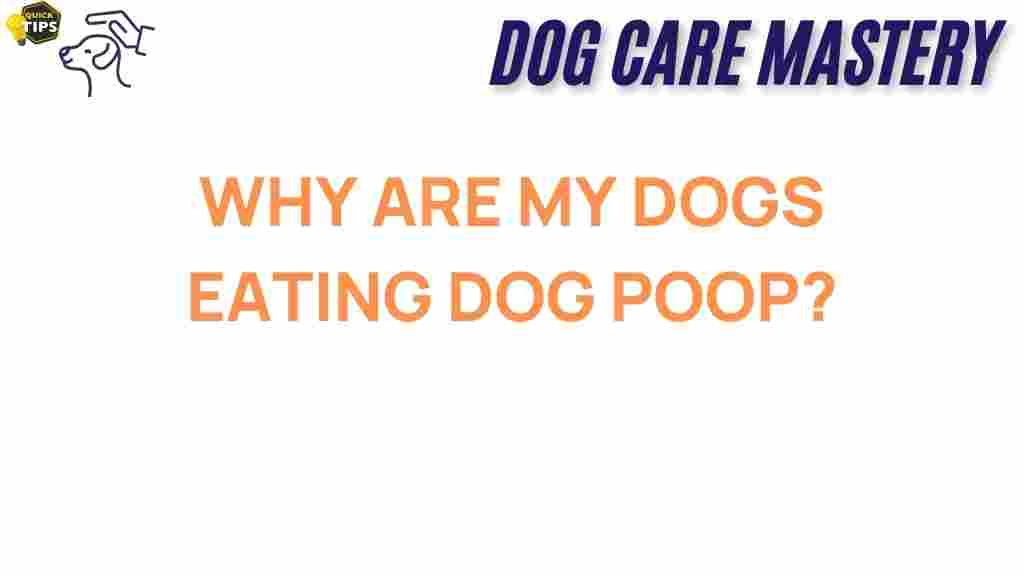Understanding Dog Behavior: Why Do Dogs Eat Dog Poop?
As pet owners, we often encounter baffling behaviors exhibited by our furry companions. One of the most alarming and disturbing habits is when dogs eat their own poop or the feces of other animals. This behavior, known scientifically as coprophagia, raises many questions among dog owners. Why do dogs engage in this habit? Is it harmful? Understanding the underlying reasons can help you manage and potentially correct this behavior.
The Science Behind Coprophagia
To comprehend why dogs eat dog poop, it’s essential to look at their natural instincts and behaviors. Dogs are descendants of wolves, who often consumed feces for various reasons:
- Instinctual Behavior: In the wild, wolves may eat feces to keep their den clean and avoid attracting predators.
- Nutritional Deficiency: If a dog is lacking certain nutrients, it may resort to eating feces to regain what it needs.
- Curiosity: Dogs are naturally curious creatures. They explore their environment through taste, which can include feces.
- Attention-Seeking: Some dogs learn that eating poop gets a strong reaction from their owners, whether positive or negative.
Common Reasons for Coprophagia
Understanding dog behavior can help identify the specific reasons behind your dog’s propensity to eat poop. Here are some common causes:
- Hunger or Starvation: Dogs that are not fed enough may resort to eating feces due to hunger.
- Anxiety or Boredom: Stressful environments or lack of stimulation can lead dogs to engage in this behavior as a coping mechanism.
- Medical Conditions: Certain health issues, such as diabetes or parasites, can cause increased appetite or malabsorption of nutrients, leading to coprophagia.
How to Discourage This Behavior
If your dog has developed a habit of eating poop, there are several strategies you can employ to discourage this behavior:
- Regular Feeding Schedule: Ensure your dog is fed a balanced diet at regular intervals. This can help reduce hunger-driven behaviors.
- Immediate Cleanup: Clean up after your dog immediately to remove the temptation of feces.
- Provide Mental Stimulation: Engage your dog in play and exercise to alleviate boredom and anxiety.
- Behavior Modification: Use positive reinforcement to reward your dog for ignoring feces.
Identifying Underlying Issues
Sometimes, coprophagia may be a symptom of a more serious issue. If your dog continues to eat poop despite your efforts, consider the following:
- Veterinary Checkup: Consult your veterinarian to rule out medical conditions that may be causing this behavior.
- Diet Analysis: Evaluate your dog’s diet to ensure it meets their nutritional needs. A diet poor in fiber or certain nutrients can lead to coprophagia.
- Behavioral Assessment: If anxiety or behavioral issues are suspected, consider consulting a professional dog trainer or behaviorist.
Step-by-Step Process to Change This Behavior
Changing your dog’s behavior regarding poop eating can take time and patience. Here’s a step-by-step process you can follow:
- Step 1: Observe: Keep track of when and where your dog eats feces. Identifying patterns can help you understand the triggers.
- Step 2: Clean Up Promptly: Make it a habit to clean up after your dog immediately during walks or in your yard.
- Step 3: Redirect Attention: Use commands such as “leave it” or “come” when you see your dog approaching poop.
- Step 4: Reward Good Behavior: Reinforce positive behavior by rewarding your dog when they ignore feces.
- Step 5: Consult Professionals: If the problem persists, seek advice from a veterinarian or a qualified dog trainer.
Health Risks of Eating Dog Poop
While coprophagia might seem harmless, it can pose health risks for your dog. Some potential issues include:
- Parasites: Eating feces can expose your dog to intestinal parasites that can lead to more severe health problems.
- Infections: Feces can carry harmful bacteria that may cause infections.
- Nutritional Imbalances: If your dog is eating poop due to nutritional deficiencies, it may lead to more significant health concerns over time.
When to Seek Professional Help
If you’ve implemented the strategies mentioned above and your dog continues to eat poop, it may be time to seek professional help. Here are some signs that indicate further assistance is needed:
- Your dog shows signs of distress or anxiety.
- You notice changes in your dog’s appetite or weight.
- There are indications of gastrointestinal issues, such as vomiting or diarrhea.
In such cases, consulting a veterinarian or a pet behaviorist can provide you with tailored solutions to address your dog’s specific needs.
Conclusion: Understanding Dog Behavior for a Healthier Pet
In summary, understanding why dogs eat dog poop is crucial for any dog owner. Whether it stems from instinct, nutritional deficiencies, or behavioral issues, addressing this habit requires patience and proactive measures. By observing your dog’s behavior, ensuring they receive proper nutrition, and providing mental stimulation, you can help reduce the likelihood of coprophagia. If problems persist, consider seeking advice from professionals, as they can provide valuable insights into your dog’s behavior.
For more information on dog behavior and training, check out this informative guide. Remember, every dog is unique, and with the right approach, you can foster a healthier relationship with your furry friend.
Additionally, if you’re interested in understanding more about canine nutrition, visit this resource for expert advice.
This article is in the category Behavior and created by dogcaremastery Team
